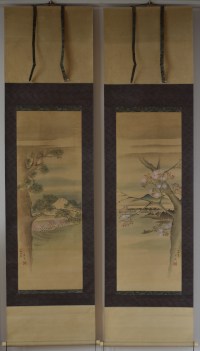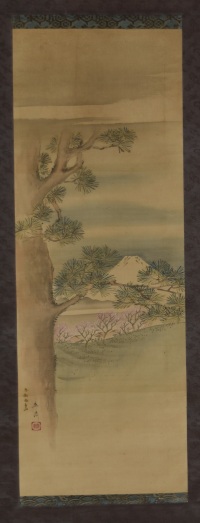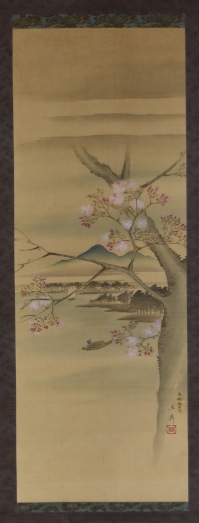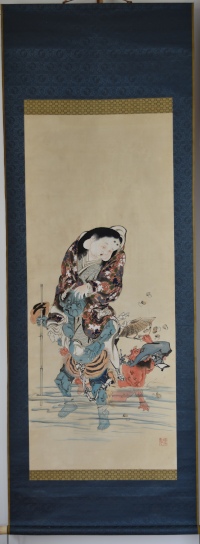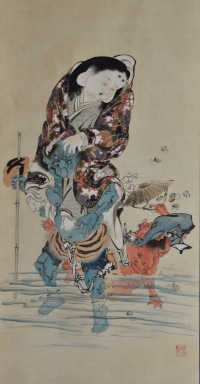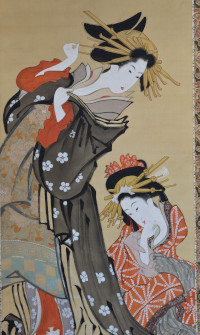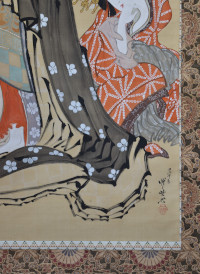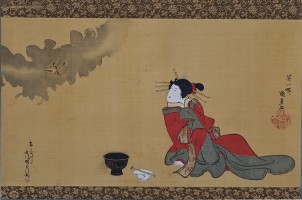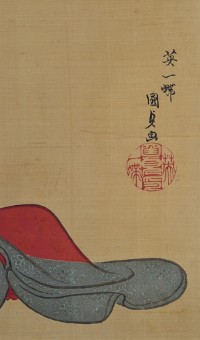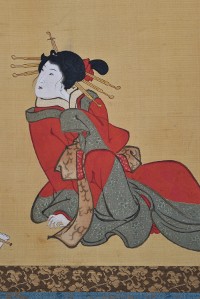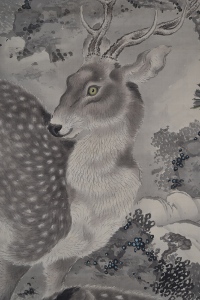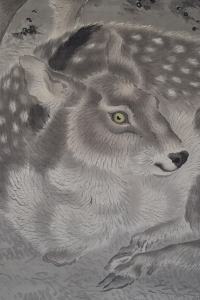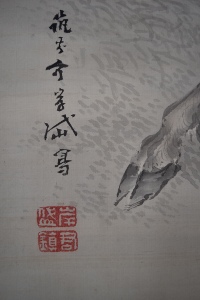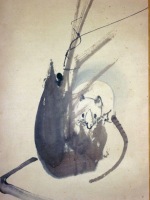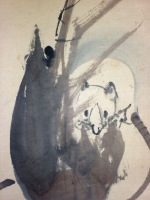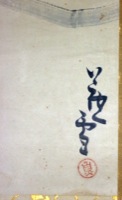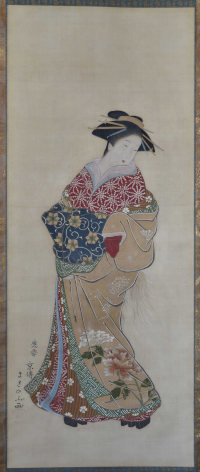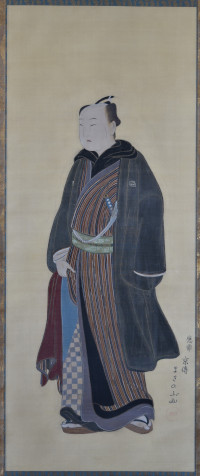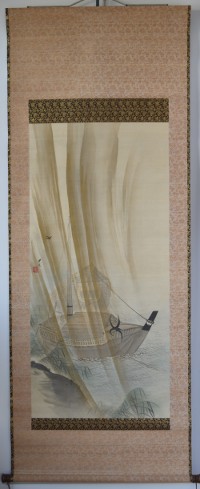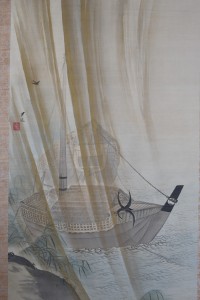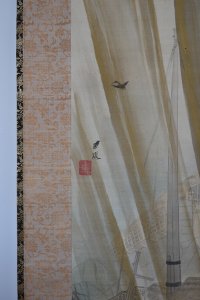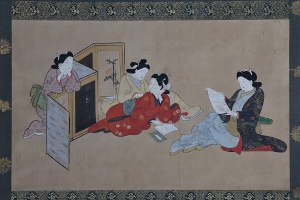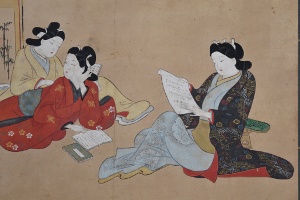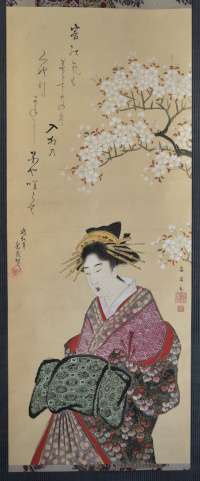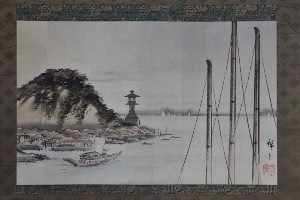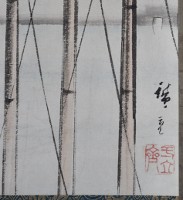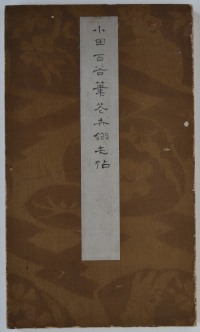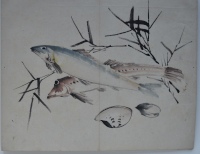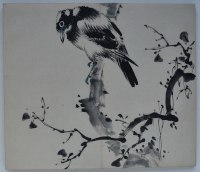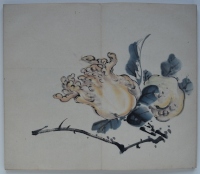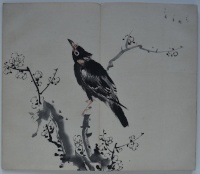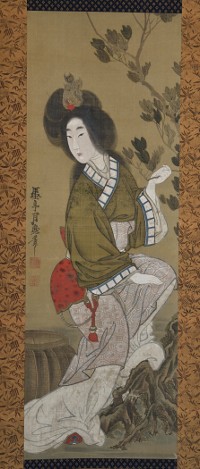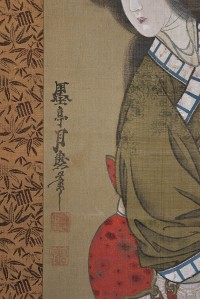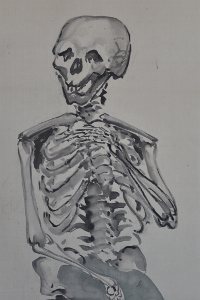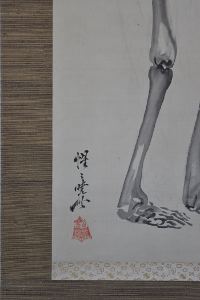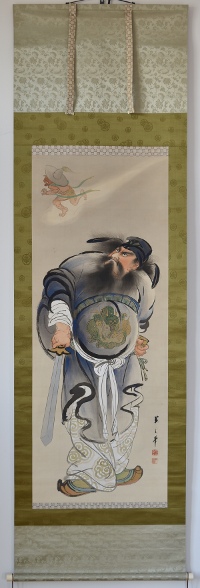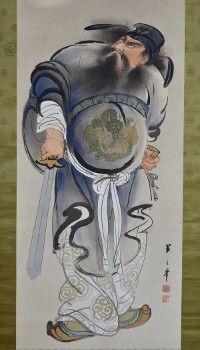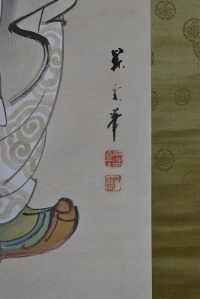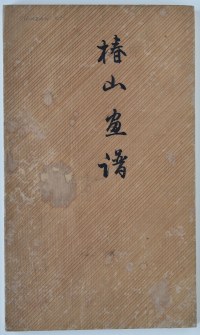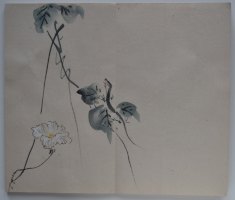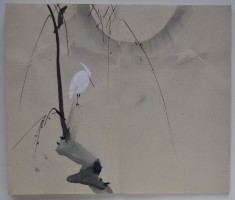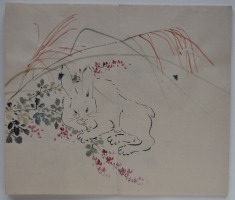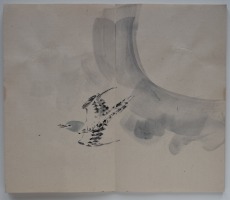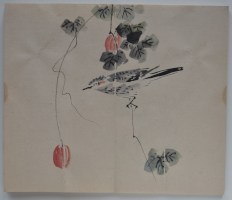Utagawa HIROSHIGE (1797-1858)
Click here to view image full size.
An important pair of original paintings, light colour on silk, 35.5 x 12.75 in; 90 x 32.5 cms. The left painting shows Asukayama in the Eastern Capital (Edo). This was one of the top areas to view the abundant cherry trees, the first of which were planted by the Shogun Tokugawa Yoshimune. A fir tree is seen to the left with cherry trees on the lower slope and a majestic Fuji in the distance. A large foreground object, often only partly shown, is a characteristic of many Hiroshige paintings and prints: They lead the eye into a composition and give perspective. The right-hand painting shows the Sumida River in the Eastern Capital (Edo) with a flowering cherry tree in the foreground. (See the comment above.) The sakura flowers from the end of March to early May and the sakura-zensen, blossom forecast, by the weather forecasters is watched assiduously as the blossom is so transient.
Each painting signed Ryusai with Hiroshige seal. Hiroshige produced a number of paintings in this format with this signature and seal, c. early 1850s. In good condition.
Status: Available
Totoya HOKKEI (1780-1850)
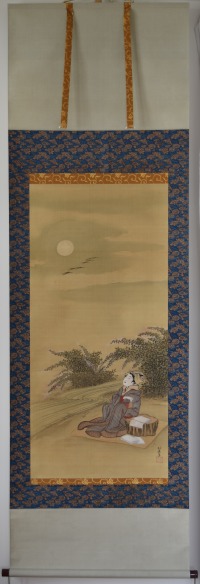
Click here to view image full size.
An original painting by Hokkei, full colour on silk, 41.5 x 19.25 in; 105.5 x 49 cms. Hokkei was one of the earliest and best pupils of Hokusai. Probably best known for his large output of surimono, but also produced illustrated books and paintings. Shows a beauty fulling cloth beside the Kinuta River, Settsu Province. She gazes at the full moon and a flight of geese. On each side of the stream is Japanese bush clover, associated in Japan with autumnal melancholy and unrequited love.
Signed Hokkei ga with Hokkei seal.
Status: Available
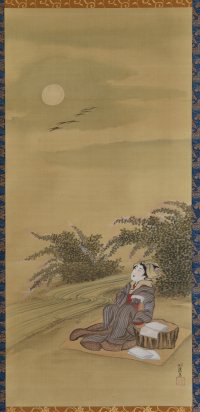
Click here to view image full size.
Kawanabe KYOSAI (1831-1889)
Click here to view image full size.
A fine original Kyosai painting, full colour on paper, 51.5 x 21.5 in; 131 x 54.5 cms. Shows Otafuku being carried across a river on the back of a blue oni. They look down with consternation at a red oni who has fallen into the water spilling his basket of mushrooms. The face of the blue oni takes on the appearance of Hyottoko, the male pairing of Otafuku. Known as the Goddess of Mirth, Otafuku is often shown with the Seven Gods of Good Fortune. There are various theories as to her origins and her face, in the form of a mask, has become ubiquitous. Kyosai was a draughtsman of great dexterity with a wild, often bizarre, imagination. Loved sake, sometimes painting under its influence. At an early stage studied under Kuniyoshi, then Maemura Towa and later Kano Chinshin before becoming an independent painter at 27. Adept at highly finished paintings but also produced a large corpus of spontaneous paintings.
In very good condition. Provenance: The inside of the lid on the box is signed and sealed by Mano Gyotei (Kyotei) who was Kyosai’s pupil and guarantees the painting. Sealed Kyosai.
Status: Available
Watanabe SEITEI (SHOTEI) (1851-1918)
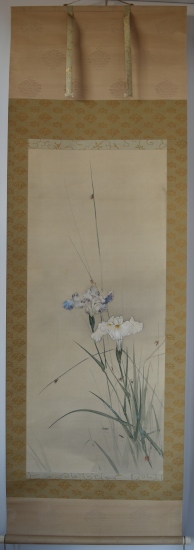
Click here to view image full size.
A large original painting, full colour on silk. Image size 47.25 x 20 in; 120 x 51 cms. Shows Japanese water iris with water striders. Seitei is best known as a kachoga (“bird and flower”) artist. He was technically brilliant showing realistic detail in a Japanese style but with Western sensibilities absorbed while living in Paris and he was, in fact, the first Nihonga artist to reside in Europe. A winner of many prizes during his life. Also published Seitei kacho gafu, 1890-91; Kacho gafu, 1903; Seitei kacho, 1916.
Signed and sealed Shotei. Very good condition. (This painting makes an excellent pair with the following offering although the mount sizes are slightly different.)
Status: Available
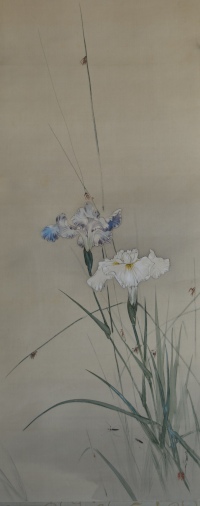
Click here to view image full size.
Watanabe SEITEI (SHOTEI) (1851-1918)

Click here to view image full size.
A large original painting, full colour on silk. Image size 47.25 x 20 in; 120 x 51 cms. Shows Japanese water iris with a snail. Seitei is best known as a kachoga (“bird and flower”) artist. He was technically brilliant showing realistic detail in a Japanese style but with Western sensibilities absorbed while living in Paris and he was, in fact, the first Nihonga artist to reside in Europe. A winner of many prizes during his life. Also published Seitei kacho gafu, 1890-91; Kacho gafu, 1903; Seitei kacho, 1916.
Signed and sealed Shotei. Very good condition. (This painting makes an excellent pair with the above offering although the mount sizes are slightly different.)
Status: Available
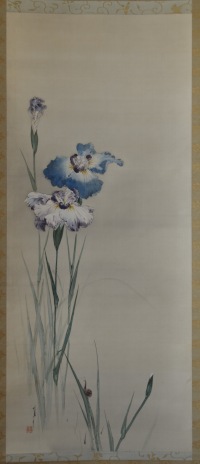
Click here to view image full size.
Ryuryukyo SHINSAI (1764-1820)

Click here to view image full size.
An original painting, sumi and light colour on silk, 32 x 11 in; 81.3 x 28 csms. Shows three classes in Japanese society: Farmer’s wife, Priest and a Samurai, forced to shelter together at the entrance to a Shinto shrine from a sudden downpour of rain. Above, a rooster and hen also shelter. These birds were allowed to roam freely around Shinto Temples. Shinsai was one of Hokusai’s best pupils. Known for his fine surimono and paintings. Signed Ryuryukyo Shinsai with Ryuryukyo seal. In good condition.
Status: Available
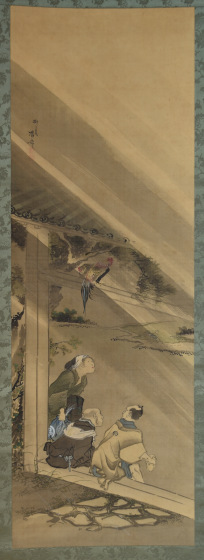
Click here to view image full size.
Hishikawa MOROSHIGE (Fl. 1684-1704)

Click here to view image full size.
An original painting, sumi and full colour on paper, 24 x 12 in; 61 x 30.5 cms. Shows a beautiful youth (a wakashu) dressed as a girl with his attendant servant. These youths (identified as male by wearing a sword) were arbiters of trend-setting kimono design. They are sometimes referred to as the “third gender,” and were sexually ambiguous being objects of desire to both adult men and women. Moroshige was the senior pupil of Hishikawa Moronobu, and, it is said, was the father of Furuyama Moromasa. Some toning of paper and slight loss of pigment, but all commensurate with a painting of this age. Otherwise good condition. Painted around 1700.
Signed Hishikawa Moroshige zu with seal Moroshige. A fine and interesting painting.
Status: Available
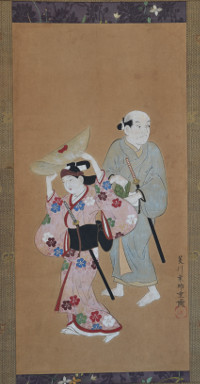
Click here to view image full size.
Toba HIROMARU (Active 1804-1818)

Click here to view image full size.
An original painting showing a parading courtesan. Sumi and colour on paper, 45.5 x 11.25 in; 115.5 x 28.5 cms. A rare artist of the Utagawa school. Probably a pupil of Utagawa Toyohiro. His extant paintings show a considerable talent with particularly attenuated faces. Another example is in the MFA, Boston, acc. no. 11.7369 as well as there having been two sold at auction: Christies, NY 16/9/2003, lot 153 and Bonhams NY 18/3/2015, lot 3010. Some minor marks and creasing, but otherwise good condition. Signed Toba Hiromaru hitsu. Seal unread.
Status: Available

Click here to view image full size.
Kawanabe KYOSAI (1831-1889)
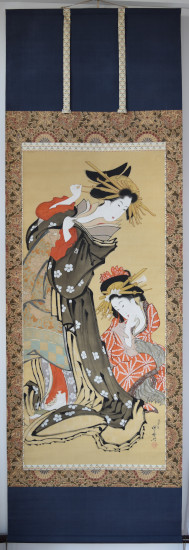
Click here to view image full size.
A large original painting, full colour on silk, image size 48 x 21.75 in; 122 x 55.25 cms. A draughtsman of great dexterity with a wild, often bizzare , imagination. Loved sake, sometimes painting under its influence. At an early stage studied under Kuniyoshi, then Maemura Towa and later Kano Chinshin before becoming an independent painter at 27. Adept at highly finshed paintings but also produced a large corpus of spontaneous paintings. Shows a standing courtesan with her kamuro. An homage to Hokusai whom he obviously admired.
Highly finished in places but also incorporating quirky elements of Hokusai’s style. Signed Hokusai hitsu-i (“Imitating Hokusai’s brush”) Shojo Kyosai. In very good condition with old double box with an untranslatable annotation on inside of lid comparing him to Hokusai. An important new discovery.
Status: Available
Utagawa HIROSHIGE II (1829-1869)

Click here to view image full size.
An original painting, full colour on silk, 37 x 14 in; 94 x 35.5 cms. The pupil of Hiroshige I who gave him the name Shigenobu. Adopted by Hiroshige in 1845 and married his daughter, Otatsu, on Hiroshige’s death. (Later divorcing her around 1865.) Shows a beauty cooling off on the prow of a boat beneath a full moon and the trestles of a bridge. (Probably the Ohashi over the Sumida River.)
In very good condition and possibly his best painting. Signed Hiroshige ga, seal unread.
Status: Available
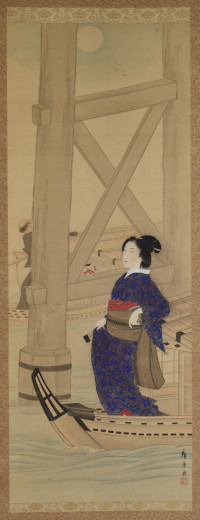
Click here to view image full size.
Yamamoto FUJINOBU (Active 1750-1770)

Click here to view image full size.
An original painting, full colour on paper, image size 32.25 x 7 in; 82 x 18 cms. Shows a parading courtesan with her kamuro. A painter and print artist whose prints were always published by Yamamoto Fusanobu giving rise to the theory that Fujinobu was a pseudonym of the publisher. Much influenced by Harunobu. His prints are extremely rare. Slight creasing, otherwise good condition. Signed Fujinobu ga with indistinct seal.
Status: Available

Click here to view image full size.
Kawanabe KYOSAI (1831-1889)

Click here to view image full size.
A fine original Kyosai painting, full colour on silk, 47.5 x 16.5 in; 121 x 42 cms. Shows Emma, the King of Hell, walking with and holding an umbrella above a courtesan while a ghoulish oni looks on wearing a costume of gunnera leaves. Emma-O is the Japanese Buddhist version of Yama, the Hindu god of death. It was he who assigned people after death to one of the states of reincarnation. He is shown with the headdress, robes and holding the staff of a Chinese judge. The preparatory drawing for this painting is illustrated in Kawanabe Kyosai, In Honour of 100TH Anniversary of His Death, published by Ukiyoe Ota Kinen Bijutsuken, 1989, no. 61, p. 60. Kyosai was a draughtsman of great dexterity with a wild, often bizarre, imagination. Loved sake, sometimes painting under its influence. At an early stage studied under Kuniyoshi, then Maemura Towa and later Kano Chinshin before becoming an independent painter at 27. Adept at highly finished paintings but also produced a large corpus of spontaneous paintings.
In very good condition. Signed Seisai Kyosai with Kyosai seal.
Status: Available
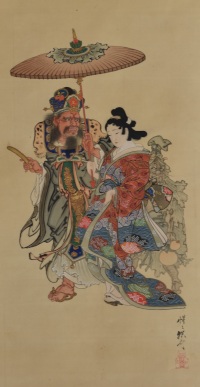
Click here to view image full size.
Utagawa KUNISADA (1797-1861)
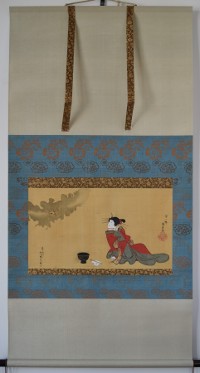
Click here to view image full size.
A fine and interesting original painting, full colour on silk, 11.25 x 20.25 in; 28.5 x 51.5 cms. Shows a reclining beauty looking up at a cuckoo (hototogisu) flying in clouds. The cuckoo is the harbinger of the summer months. This painting, made c 1830, reflects Kunisada’s study, together with Ikkei, of the work of Hanabusa Itcho (1652-1724). Indeed, Ikkei gave Kunisada the name Hanabusa Ittai and this painting is signed Hanabusa Itcho Kunisada ga with seal Hanabusa Ittai Kunisada no in. To the bottom left is an inscription reading “A disciple of Utagawa Kunisada drawn on request [the cuckoo].” There is a small seal but it is undecipherable.
Minor marks but in generally very good condition. Touches of gold and the gofun on the face well retained. Newly mounted with new box.
Status: Available
Hishikawa SORI (Active 1797-1813)

Click here to view image full size.
An original painting, full colour on silk, 43.25 x 14 in; 109.8 x 35.6 cms. An early pupil of Hokusai (who gave him his name Hishikawa Sori in 1798, it previously being Tawaraya). Generally referred to as Sori III. Produced a considerable number of small surimono – some of which can be confused with Hokusai’s work. Shows a beauty with a monkey at her feet. There is a print closely following the painting published in 1906. Illustrated in Nihon ukiyoe hakubutsukan, ed., Nikuhitsu ukiyoe senshu gekan (Selected Painting of Ukiyo-e, second vol.) Tokyo: Gakushu kenkyusha, 1985, plate 193.
In very good condition. Signed Hyakurin Sori ga with seal Sori.
Status: Available
Teisai HOKUBA (1771-1844)
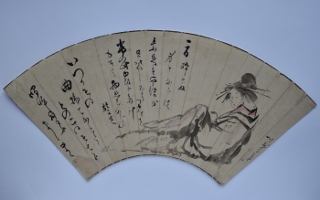
Click here to view image full size.
One of Hokusai’s best pupils. Known for his paintings of beauties but also designed some fine surimono. An original fan painting showing a reclining beauty. Sumi and light red on silvered paper, 7.25 x 17.75 in; 18.5 x 45.2 cms. Removed from a fan, so rib folds and other minor marks. Signed Hokuba ga.
Status: Available
Kitagawa FUJIMARO (1790-1850)

Click here to view image full size.
An original painting, full colour on silk, image size 35.25 x 13.5 in; 89.5 x 34.5 cms. Fujimaro was a talented late pupil of Utamaro. More than a dozen paintings are recorded by him including an example in the Portland Art Museum, acc. number 69.51. His best-known work is in the collection of the Tokyo National Museum depicting Yujyo risshi-zu and another four paintings of beauties in the four seasons is in the collection of the Ota Memorial Museum of Art, Tokyo. Shows a standing courtesan beside a vase containing peonies and cherry blossom. On her sumptuous costume are the black wheels of a hanaguruma, “flower cart.” These vehicles carried baskets with often elaborate arrangements of flowers. It seems more than coincidence that the vase is placed where the basket would have been on the cart.
Painted c 1820. Signed Fujimaro with seal Yozan. Newly remounted and in fine condition with new box and futo-maki (thick wooden roll to preserve the painting from damage).
Status: Available
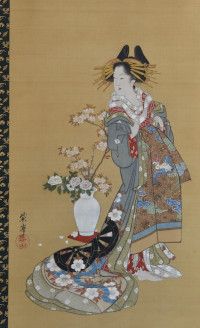
Click here to view image full size.
Kishi GANTAI (1782-1865)
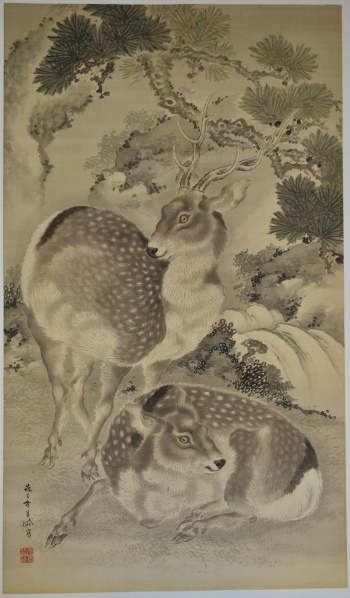
Click here to view image full size.
An extremely large painting, 55.5 x 32 in; 141 x 81.3 cms, sumi and light colour on silk. Shows a pair of Sika deer, their summer coats spotted and white. Gantai was the son and pupil of Ganku, and together with his brother, Renzan, carried on the Kishi school tradition. With his father, worked on the paintings for the new Kanazawa Castle in 1809. A highly accomplished painter, especially of kachoga. This is possibly the largest Gantai painting and it’s interesting to compare with the gajo by him also offered on this update. In very good condition. Framed and glazed. Signed Chikuzennosuke Gantai hitsu with seals Gantai and Kunchin.
Status: Available
Nagasawa ROSETSU ( 1754-1799 )

Click here to view image full size.
An original painting showing a white mouse and a spiny lobster on a tray. Rosetsu is considered one of the most important artists of the late Edo period but little is known of his short life ( he died at forty-five ) apart from the fact that he studied, and was one of the top disciples, of Maruyama Okyo. He is labelled an “eccentric” painter as he defies easy classification. His brushwork is a tour de force and he is known for his expressive depictions of animals. The Chinese-style inscription above is by Rosetsu’s friend Minagawa Kien who was a painter and scholar of Confucianism. It implies that the lobster and mouse are both signs of good fortune. Ink and light colour on paper. Image size 44.75 x 11.25 in; 113.75 x 28.5 cms.
Signed Rosetsu with seal Gyo. Painted 1790s. Inscription signed and sealed Kyosai. Slight foxing, otherwise in very good condition. One of the most copied painters. See Kono, Exhibition of Nagasawa Rosetsu, Chiba City Art Museum, 2000, pl. 42 for identical seals. Tsuji Nobu, Nagasawa Rosetsu: the Fanciful Painter, Miho Museum, 2011, pls. 19, 58-60, 67,87, 90, 91, 93 and 94.
Status: Available
Mori SOSEN (1747-1821)
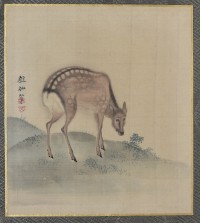
Click here to view image full size.
A fine surimono-sized painting, light colour on silk, 7.75 x 7 in; 19.5 x 17.8 cms. Shows a female sika deer. His life is not well documented but he is known to have studied under the Kano artist Yamamoto Joshunsai (?-1781) before being drawn into Maruyama Okyo’s (1735-1795) artistic circle and his style is more Shijo than anything else. His animal paintings were evidently highly valued by Okyo. He was an immediate favourite with eastern collectors because of his monkey paintings at which he excelled, although he was more versatile than literature implies and highly accomplished at painting other animals. But his images of monkeys take precedence and he is considered the pre-eminent painter, east or west, on this subject. It is alleged that he lived in the woods for three years eating fruit and nuts to study the monkeys and other animals, and is also supposed to have had a cage of monkeys at the back of his house to better observe them.
Very good condition, unmounted. Signed Sosen hitsu with seals So, Sen.
Status: Available
TORII School (c. late 1750’s)

Click here to view image full size.
An original painting, full colour on paper with gold additions, image size 30 x 10 in; 76 x 25.5 cms. Shows a beauty holding up a puppet of the actor Bando Hikosaburo II. Painted c. late 1750s and possibly by Torii Kiyomitsu. In good condition with seal Torii.
Status: Available
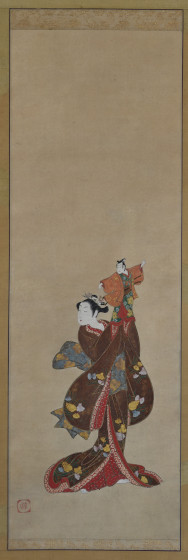
Click here to view image full size.
Mori SOSEN (1747-1821)

Click here to view image full size.
An original painting, sumi and light colour on silk, 42.5 x 16 in; 108 x 40.5 cms. His life is not well documented but he is known to have studied under the Kano artist Yamamoto Joshunsai (?-1781) before being drawn into Maruyama Okyo’s (1735-1795) artistic circle and his style is more Shijo than anything else. His animal paintings were evidently highly valued by Okyo. He was an immediate favourite with eastern collectors because of his monkey paintings at which he excelled, although he was more versatile than literature implies and highly accomplished at painting other animals. But his images of monkeys take precedence and he is considered the pre-eminent painter, east or west, on this subject. It is alleged that he lived in the woods for three years eating fruit and nuts to study the monkeys and other animals, and is also supposed to have had a cage of monkeys at the back of his house to better observe them. This high quality painting shows two monkeys sitting on the branch of a cherry tree. Signed Sosen with two Sosen seals. In good condition.
Status: Available
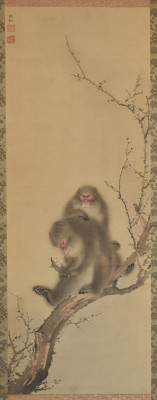
Click here to view image full size.
Utagawa KUNIMASA II (KUNIMUNE II) (1792-1857)

Click here to view image full size.
An original painting, full colour on silk, 38.75 x 14 in; 98.5 x 35.6 cms. Shows a beauty at a Satori no Mado (round window of enlightenment) unrolling a handscroll, a willow tree above. Kunimasa II was a pupil of Toyokuni and, apart from paintings, also designed surimono. Another example is in the Art Gallery of NSW, acc. no 108.2019. In good condition. Signed Utagawa Kunimasa ga. Seal unread.
Status: Available
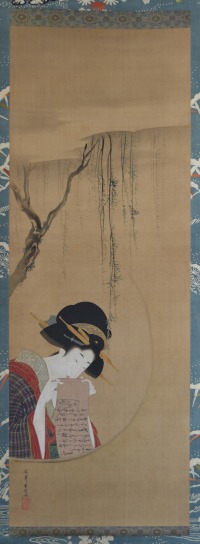
Click here to view image full size.
Santo KYODEN (Kitao MASANOBU) (1761-1816)
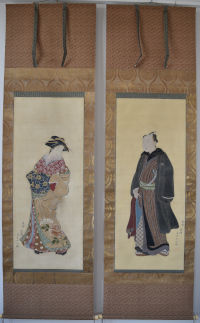
Click here to view image full size.
A pair of original paintings, full colour on silk, image size 38.5 x 15.5 in; 97.75 x 39.5 cms. Shows a courtesan on the left with a portrait of a novelist on the right. The paintings are signed “By special request” and were presumably commissioned by the novelist showing his paramour. I have not identified the novelist. Masanobu was a pupil of Shigemasa and was one of the leading authors and illustrators of kibyoshi, ehon and kyoka anthologies as well as being a painter and print artist. He illustrated the fine set of double-oban prints of courtesans in 1783-4: Yoshiwara keisai shin bijin awase jihitsu kagami. These painting must come from around this date as the pose of the courtesan is very similar to some of the figures in the above album. A controversial figure who ran foul of the authorities in 1789, subsequently ceasing to use the name Kitao Masanobu and thereafter his paintings are always spontaneous in an abbreviated style, often quite slight and signed Kyoden. Paintings fully finished like this are rare. In generally very good condition, although some loss of gofun. Signed Oju Kyoden Masanobu ga on each painting.
Status: Available
Cho GESSHO (1772-1832)
Click here to view image full size.
A large original painting of moored junks caught in a violent squall. A fine painter who studied under Tanke Gessen and Matsumura Goshun in Kyoto before moving to Nagoya in 1798 and becoming Nagasawa Rosetsu’s assistant for a short time. Also illustrated some fine ehon. Sumi and colour on silk with the currents of air painted in gold; 55.25 x 26 in; 140.25 x 66 cms. Painted c. 1810s. Provenance: Two previous owners’ seals on the exterior of mount: The Honda family library and the Ueno family. Old box with inscription which states that Gessho wanted to acquire a painting from the Owari district. Although not intrinsically valuable it was esteemed by the local people. He offered to exchange the painting offered here for their painting. There is a dig here in that the inhabitants of Owari were known to be avaricious. Written by Mizutani Okurei (1848-1926). Presumably based on the accounts of the two previous family owners.
Signed Gessho with seal: Yukisada, Genkei, Gessho. Obviously an important painting by Gessho and in very good condition.
Status: Available
Utagawa HIROSHIGE (1797-1858)
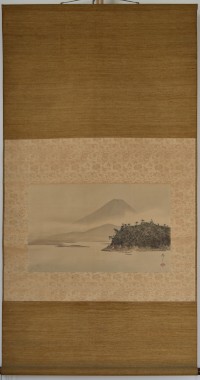
Click here to view image full size.
An original painting, sumi and light colour on silk, 11 x 18 in; 28 x 45.75 cms. Shows the sea off the Miura Peninsula in Sagami Province with Mount Fuji rising above mist in the distance. Hiroshige used the same view for one of his designs for the Thirty-six Views of Fuji set published in 1858. A beautiful painting with a signature dating it to the mid to late 1830s.
Minor creasing and old mount, otherwise good condition. Signed Hiroshige with Hiro seal.
Status: Available

Click here to view image full size.
ANONYMOUS (Mid to late 19th century)

Click here to view image full size.
A fine original painting in muted tones on silk, 43.75 x 16.5 in; 111.2 x 41.9 cms. Shows a vengeful female ghost (yurei) emanating from a ball of fire. She wears a plain white kyokatabira (funeral robe), has long unkept hair and her claw-like hand clutches her skeletal chest. Yurei-zu reached a peak of popularity in the 19th century, there being a seemingly insatiable demand from the public for stories of ghosts, demons and the supernatural reflected in popular fiction, Kabuki drama and art in general. These ghost paintings were often not signed: This one bears two seals reading “surpassing lotus” and “happy and heaven.” In very good condition with the surrounding mount: hashira and ichimonji areas painted in imitation of silk (kaki byoso) and the image overlapping these areas.
Status: Available
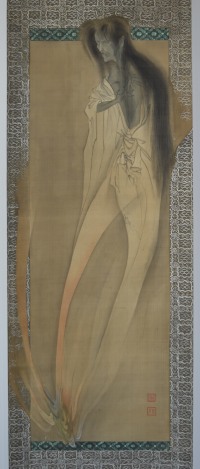
Click here to view image full size.
Hishikawa MOROSHIGE (FL. 1684-1704)
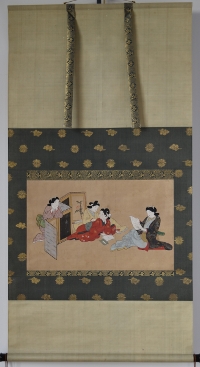
Click here to view image full size.
An original painting showing a high-ranking samurai household at leisure. Moroshige was the senior pupil of Hishikawa Moronobu, and, it is said, was the father of Furuyama Moromasa. Sumi and full colour with gold additions on paper. 11.5 x 19 in; 29 x 48.25 cms. This is most likely from a handscroll as the height is correct, and the slight vertical striations indicate it has been rolled at some time. Painted c. 1700. Some slight loss of pigments, especially the verdigris and minor marks, but all commensurate with the age of the painting. The details on the costumes of the two main figures are exquisite.
Status: Available
KYOJINSAI (Fl. c 1789-1801)
Click here to view image full size.
A large and fine original painting by an artist whom I am unable to find in the literature; possibly a pseudonym. Shows a high-ranking courtesan wearing a sumptuous kimono under cherry blossom. Full colour on paper, 49.25 x 20 in; 125 x 51 cms. The calligraphy above is by Kan’watei Onitake, best known as the author of a series of yomihon entitled Katakiuchi kidan Jiraiya setsuwa , “The Tale of the Gallant Jiraiya,” also known as the Jiraiya monogatari published in 11 volumes from 1806-7. The protagonist was a thief-come-wizard who is usually depicted astride a giant toad. Onitake was a pupil of Tani Buncho, Kyokutei Bakin and Santo Kyoden. It translates as a courtesan musing on the fact that customers’ attention in the spring turns to buying many things and, as the sun sets, will there be many clients in the Yoshiwara gathering as thickly as the cherry blossom. Signed Kan’watei Onitake san with a kakihan of an octopus. On the right the signature and seal of Kyojinsai. On the lid of the box is an inscription reading Kansei-ki Kyojinsai-hitsu oka no tayu sugata gasan, “A Kansai period inscribed painting of a high-class courtesan under cherry blossoms brushed by Kyojinsai.” And a repeat of the Onitake inscription. On the inside of lid: Showa shinyu Yayoi chukan, “Mid-March of the metal rooster [Showa 56/1981].” Appraised by Kimura Suetsuke ((a dealer and Ukiyo-e expert). Very good condition.
Status: Available
Ichiryusai HIROSHIGE (1797-1858)
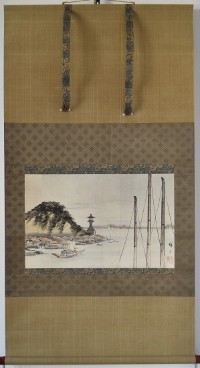
Click here to view image full size.
An original painting showing the old lighthouse at Tempozan, Osaka. To the left is the mount which was formed by earth dredged from the Ajigawa in 1831 to allow easier access for ships. In the foreground masts of moored vessels. There appear to be few images of this lighthouse. It was replaced by a lighthouse designed by the British engineer Richard Henry Brunton, the “Father of Japanese Lighthouses” in 1872. Sumi and light colour on paper, 12.75 x 20.25 in ; 32.4 x 51.4 cms.
Signed Hiroshige ga with Ichiryusai seal. Very good condition.
Status: Available
Uragami GYOKUDO (1745-1820)
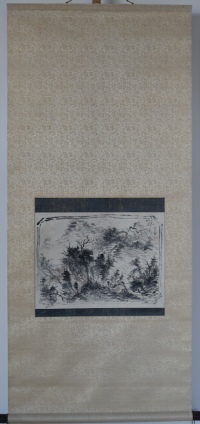
Click here to view image full size.
An original painting, sumi with light touches of pink on paper. Image size 10.4 x 14.2 in; 26 x 36 cms. Shows a hilly landscape with a small figure crossing a bridge bottom left. Gyokudo is now considered the leading exponent of Nanga painting. An artist whose spontaneous paintings often appear as though executed under deep emotion or when partially intoxicated. Now greatly admired in Japan and the West with many fakes. His father was of samurai rank and Gyokudo initially served a nobleman, Ikeda Masake, in Bizen. However, his passion for music, painting and verse composition caused him to become a wanderer in 1794. His bohemian life eventually leading him to Kyoto where he joined the literati circles of Mokubei and Chikuden. Most paintings done after 1794 and this example probably dates to around 1800-1810.
Signed Gyokudo with two indistinct seals. Good condition.
Status: Available
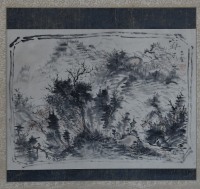
Click here to view image full size.
Oda KAISEN (1785-1862)
Click here to view image full size.
A concertina painting album, full colour on paper, 11 x 6.5 in; 28 x 16.5 cms folding out to 11 x 13 in; 28 x 33 cms. Twenty six paintings in the Shijo manner. Kaisen moved to Kyoto when he was 22 years old and studied under Matsumura Goshun but later switched from the Maruyama Shijo school to study Nanga painting with Rai San’yo.
Minor wormage, otherwise good condition. Complete with original covers and wooden box. seal.
Status: Available
Kawamata TSUNEYUKI (1677-c 1744)
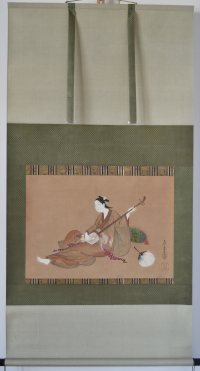
Click here to view image full size.
An original painting, full colour on paper, 13 x 19 in; 33 x 48.3 cms. Shows a reclining beauty playing a shamisen. The subtle outline of her body can be seen through her yukata. A tasseled pillow behind her and a fan lying on the floor. Tsuneyuki was the founder of the Kawamata School. (A pupil was Kawamata Tsunemasa.) Little is known of his life and there are few paintings: A group were in Christies NY, 27/10/1998, lots 40, 42, 44, 45; and there are examples in the BM, reg. no 1931,1116,0.2, the Met, acc. no 36.100.90, and the National Museum of Asian Art, Smithsonian, acc. no. F1898.118. Two small areas of restoration only visible obliquely, otherwise good condition for its period. Presented in double box. Signed Tsuneyuki hitsu with one seal Tsuneyuki, the other unread.
Status: Available
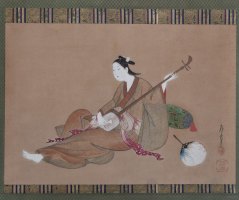
Click here to view image full size.
Kitagawa TSUKIMARO (Active c 1804-1836)
Click here to view image full size.
An original painting, full colour on dark silk, 33.5 x 11.5 in; 85 x 29 cms. Shows a Chinese beauty – possibly Yang Guikei – collecting medicinal leaves from a Japanese spice bush. An intriguing painting with Ukiyo-e elements fused with both Chinese and Western styles. Tsukimaro was Utamaro’s best pupil and his paintings are rare. Painted c 1818.
Some loss of gofun but generally good condition. Newly mounted with new box. Signed Bokutei Tsukimaro hitsu with two unidentified seals.
Status: Available
Kawanabe KYOSAI (GYOSAI) (1831-1889)

Click here to view image full size.
A draughtsman of great dexterity with a wild, often bizarre, imagination. Loved sake, sometimes painting under its influence. At an early age studied under Kuniyoshi, then Maemura Towa and later Kano Tohaku Chinshin before becoming an independent painter at 27. Was famous for his crow paintings but also loved skeletons. This newly discovered painting shows a full-length skeleton humorously hiding its genital area – not with a fig-leaf – but a large lotus leaf. Sumi and light green on silk, 38.75 x 13 in; 98.5 x 33 cms. Interestingly, a very faint under-drawing can be seen where he first thought of placing the figure.
Many copies of his work. In very good condition. Signed Seisai Kyosai with bell seal.
Status: Available
Yamamoto SHOUN (1870-1965)
Click here to view image full size.
A large original painting , full colour with gold on silk, image size 50.5 x 19.75 in; 128.25 x 50 cms. Shows Shoki, the Demon Quellor, with sword drawn watching an oni escaping on a cloud, upper left. Various Chinese legends exist regarding the origins of Shoki but the gist of them all is that Emperor Xuanzong canonized Shoki, a physician, and in gratitude Shoki vowed to protect the ruler and his heirs from demons and illness. Shoun is best known for his series of woodblocks of beautiful women, Ima Sugata, published 1906-9.
In fine condition. Signed Shoun hitsu with two seals, one reading Shoun.
Status: Available
Utagawa TOYOKUNI I (1769-1825)
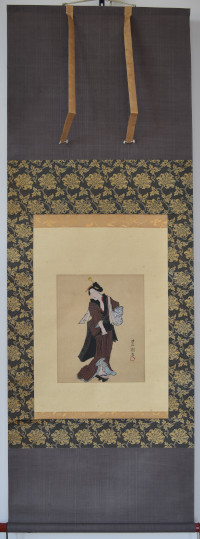
Click here to view image full size.
An original painting, sumi and colour on silk, 10.5 x 8.75 in; 26.7 x 22.2 cms. A beauty after a bath. Signed Toyokuni ga with his kakihan. In very good condition.
Status: Available
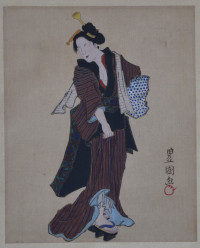
Click here to view image full size.
Totoya HOKKEI (1780-1850)

Click here to view image full size.
An original painting, full colour with gold outline to robe, 32 x 10.75 in; 81.3 x 27.3 cms, on silk. Shows a beauty erotically biting on her hand towel (tenugui) while on the way to a public bath house. This gesture represented deep emotion. Hokkei was one of Hokusai’s earliest and best pupils who not only produced paintings but illustrated books and is especially known for his fine surimono. Illustrated in Nihon ukiyoe hakubutsukan, ed., Nikuhitsu ukiyoe senshu gekan (Selected Painting of Ukiyo-e, second vol.) (Tokyo: Gakushu kenkyusha , 1985). Plate 188. In very good condition with an interesting shibori (tie-dyed) mount, cleverly echoing the pattern on the material she holds. Signed Hokkei ga with Hokkei seal.
Status: Available
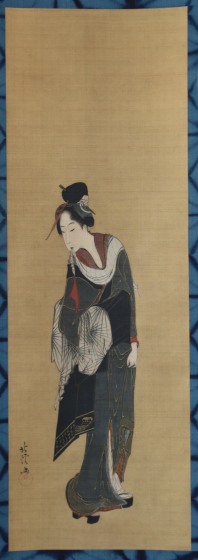
Click here to view image full size.
Tsubaki CHINZAN (1801-1854)
Click here to view image full size.
An original painting album, 11 x 13 in; 28 x 33 cms (folded out). Chinzan, a Nanga painter, was Watanabe Kazan’s best pupil. The sketchbook has 25 extremely abbreviated sketches using minimal brushstrokes.
Status: Available
Utagawa KUNIYOSHI (1797-1861)
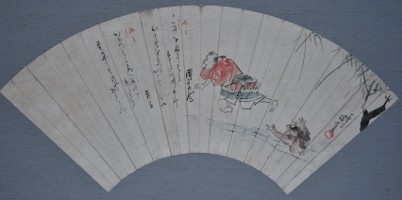
Click here to view image full size.
An original fan painting, 6.5 x 17.5 in; 16.5 x 44.5 cms. Sumi and colour on treated paper. Shows a kappa appearing from the Sumidagawa and terrifying a man who runs for his life. Kappa were amphibious creatures found in rivers and ponds. Their bodies were covered with a horny carapace like a tortoise, with scaly legs and four frog-like webbed feet. They loved to wrestle and were known to attack humans – especially children, and horses. However, they could be tricked as they were very polite. If you bowed to a kappa he invariably bowed back, and as their source of power lay in a pool of water contained in a depression in the head, this would be spilt and they became immobilized. Laid around the edge onto Japanese board with the ribmarks evident as it has been dismounted from an ogi or folding fan. Signed Ichiyusai Kuniyoshi ga with hand-painted toshidama seal. Good condition.
Status: Available
Mori SOSEN (1747-1821)
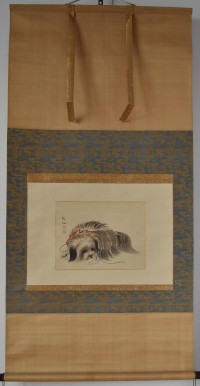
Click here to view image full size.
An original painting, sumi and light colour on silk, image size 8 x 10.75 in; 20.5 x 27.5 cms. His life is not well documented but he is known to have studied under the Kano artist Yamamoto Joshunsai (? -1781) before being drawn into Mauyama Okyo’s (1735-1795) artistic circle and his style is more Shijo than anything else. His animal paintings were evidently highly valued by Okyo. He was an immediate favourite with eastern collectors because of his monkey paintings at which he excelled, although he was more versatile than literature implies and highly accomplished at drawing other animals (as here). But his images of monkeys take precedence and he is considered the pre-eminent painter, east or west, on this subject. It is alleged that he lived in the woods for three years eating fruit and nuts to study the monkeys and other animals and is also supposed to have had a cage of monkeys at the back of his house to better observe them.
Shows a Japanese Chin. These small dogs are supposed to have been introduced to the Japanese court from China early on but their distinctive features were developed in Japan. Signed Sosen with seals Shusho. In very good condition.
Status: Available
